Did Thatcher Kill All Ten, or only 4?
Rusty Nail at the Slugger O’Toole website
The question over the deaths of the last six hunger strikers still remains. The debate has moved on since the publication of Richard O’Rawe’s Blanketmen, which raised the point that the prisoners had accepted an offer from the British which the outside Republican leadership overruled. When his book first came out, denials from the Sinn Fein camp abounded: there was no offer, there was no deal, there was no conversation, O’Rawe made it all up to sell books. Since then, however, more and more information and confirmation has come out that supports O’Rawe’s contention, and the SF position has moved from total denial to one of agreeing that there was a back channel with Mi6 via the ‘Mountain Climber’ and Brendan Duddy, and that an offer was made and conveyed to the prisoners. But the question still hangs – what happened with the prisoners’ acceptance of that offer/deal? All the irrelevant details explaining the timelines, the different strands of negotiations, who was driving who to the prisons when, avoids the crux of the matter. The prisoners said yes, there is enough there, and the outside said, not quite, which meant six other hunger strikers died. Each argument that the SF camp advances, in the main from Danny Morrison, who is reported to currently be back in their fold, unwittingly gives added weight to O’Rawe’s point. Sooner or later, however, they are going to have to stop the denials and confusion and answer in simple terms. Why were the prisoners over-ruled? And when that answer is given, it had better not be supported by yet more lies.
Update: Statement from Kevin McQuillan in response to Danny Morrison
Update: O’Rawe responds to Morrison, Irish News
Sunday:
‘Adams Complicit Over Hunger Strikers?’
NIO Documents on Sunday Times website
“The Thatcher Intervention”, Anthony McIntyre
Monday:
Irish News: Hunger Strike deal ‘must be disclosed’
Irish Times: SF denies claims on hunger strike deaths
Radio Foyle, The Morning Programme (link lasts a week): Willie Gallagher, IRSP and Danny Morrison, begins @ 8 mins
Statement from Kevin McQuillan in response to Danny Morrison’s comments on Radio Foyle:
During the period of the Hunger Strikes(s) I sat on the Belfast Executive of the H-Block, then H-Block/Armagh Committee. I did so as the Republican Socialist prisoners’ representative. During this I time interacted and consulted with numerous senior members of the provisional movement in relation to the ongoing Prison campaign, and developments therein.
I wish to respond to claims made by Danny Morrison on Radio Foyle, yesterday April 6th 2009. I did take Danny Morrison (as I had other provisional representatives) to Long Kesh in July of 1981.
Whilst I have yet to personally hear the said interview, I am led to believe that Danny Morrison said that I was told of, or was already aware, of a set of proposals that were to be put to the prisoners, and that we had talked of this.
This did not happen. If he had of appraised me of such a serious development, my first point of reference would have been to contact the National leadership of the Republican Socialist Movement, in particular those delegated with the struggle within the Blocks. At no point had I cause to.
Clearly put…it did not happen.
Tuesday:
Irish News: Morrison rubbishes renewed claims of Hunger Strike deal
Bobby Sands Trust: Documents Still Withheld
Thursday:
Irish News: “Let’s have the whole truth about the Hunger Strike”, Richard O’Rawe response to Danny Morrison
IRSP Response to Downing Street Documents 02-04-09
The IRSP believe that these Downing Street documents, at face value, appear to vindicate Richard O’Rawe in the claims he made in regards to this crucial period of the Hunger Strike. These confidential 10 Downing Street letters, which were written contemporaneous, certainly contradict PSF’s version of events from that period. The IRSP have been investigating similar claims that are contained in these documents for quite some time and will be making their conclusions public after examining the evidence in its totality.
Over the past number of days the IRSP has been speaking to relatives of the three INLA Hunger Strikers, ex-INLA Army Council members who were involved in the Strike at that time and also to the then OC of the INLA prisoners about these particular documents. All have stated that they were not aware of the ‘back-channel initiative’ or of an ‘acceptance of the content of Thatcher’s offer but not the tone’ by the PIRA in July 8th 1981 which these documents clearly indicate.
Both the then INLA Army Council and the INLA prisoners OC have stated to the IRSP that if they had have been made aware of the content of these developments at that time they would have ordered the INLA prisoners to end their hunger strike.
Many questions now arise from these documents which only the NIO, PSF, the Mountain Climber and Brendan Duddy can answer and therefore the IRSP would call on all these parties to reveal all the documentation and information that are relevant to this period. The IRSP, on behalf of some of the relatives of the Hunger Strikers, will be seeking meetings with the relevant parties in the very near future.
Michael Devine Junior speaking this morning to the IRSP has stated that -“the families demand and deserve the truth about what really happened during this period. These latest disclosures have added substantial weight to previous claims that the last six hunger strikers lives could have been saved. Did my Father and his five comrades die because a number of individuals didn’t like the tone of Thatcher despite accepting the content of her offer? Why were the families or the prisoners themselves never told about the nature and content of these contacts? I would appeal to SF and the British Government, given their public positions on truth and reconciliation, to tell us the truth and give us closure.”
Willie Gallagher on behalf of the IRSP Executive 02-04-09
From the McIntyre interview with O’Rawe:
About the end of the first (1980) hunger strike:
Q: [Gibney] wrote one time that the peace process does not want truth and cannot function with it. Another time he claimed that Bobby Sands wrote out on the evening of the end of the 1980 hunger strike that he would begin a new hunger strike on the 1st of January. Which meant the Brits had no time to renege on the offer they supposedly made to end the first strike. This was an admission that the first strike collapsed and the Brits did not renege. It also means that Gibney is contradicting himself when he wrote in the Irish News that ‘the document could have been the basis’ to end the protest. Why otherwise would Bobby have written out stating his intention to start a new strike when there was absolutely no time to test the Brits for sincerity? I look for the faux pas rather than the intent in what he writes. I am waiting on you to be labelled a securocrat in that column. The problem is that you support the peace process.
A: Firstly, let’s look at what Gibney said in the first part of his 11 May article. In relation to the Brit document that was delivered to the hunger strikers after they had come off the 1980 strike, he said, ‘hours before the document arrived the strike was ended rather than let Sean McKenna die. The document could have been the basis on which the prison protests ended. However the document was an offer from the British to the prisoners not an agreement. There is a huge difference.’ How right he is! But if there was no ‘agreement’ between the two parties at the end of the first hunger strike, then how could the Brits be accused of ‘reneging’ on an agreement? That’s why Bob immediately wanted a second hunger strike. He knew there was no agreement. We all did. The first hunger strike collapsed. The Dark told the Daily Mirror, that the boys had indicated they were not prepared to die. So all this stuff that Big Laurny McKeown is going on about, you know, the ‘we wanted to avoid a repetition of what happened at the end of the first hunger strike, when the Brits reneged on a agreement/deal,’ is pure bullshit. Understanding that is crucial to removing the gobbledygook that Laurny, Morrison and Co. have thrown up to cloud the issue in the second hunger strike. They are talking what Mick Collins called ‘ballsology.’
Q: It seems that you are right and that once again Gibney has put his foot in it. I have written elsewhere that the need to have firm guarantees on any offer from the Brits was understandable but not because of what happened at the end of first hunger strike. 1980 failed before the Brits made any offer that needed to be guaranteed. If the leadership is inaccurate about the ending of the 1980 hunger strike then its account of the 1981 hunger strike depreciates in value.
About the chain of command between inside and outside the prison:
Q: I think there is some confusion that you could help clear up. It relates to the decision making process during the hunger strikes. What was the chain of command and what say if any had the prisoners in the decision making process?
A: Anyone listening to the likes of Laurny would think that the hunger strikers had the ultimate say in this. Let’s get real here. Laurny is trying to protect Big Gerry. The foot-soldiers in the trenches never dictate strategy. Why, even the majors and the colonels – in this case, Bik and myself – didn’t have that power. Tactics come from afar; from people who are removed from the field of conflict, but who have the power to determine strategy. People should read Bik’s comm to Adams on page 336, Ten Men Dead. On that page Bik told the hunger strikers that, ‘I explained the position about my presence being essential at any negotiations …’
Q: What is the significance of this? Would Bik not have a right, even an obligation to be there?
A: Let me give you an example which shows the real purpose served by Bik’s presence. It also illustrates their tactic of dictating the ground on which the debate will take place – and they’ve done this rather successfully, I think. Right, they have restricted the whole debate to the four days before Joe died. But 11 days later, the Mountain Climber came back with the same offer. Adams was on the blower to him. Adams told the hunger strikers about this offer when he visited the camp hospital on 29 July, so there is no disputing that this offer was genuine. Yet when the Mountain Climber came off the mountain for the second and last time, Bik didn’t even know what had been rejected on his behalf. This is evident from Bik’s comm to Adams, dated 22.7.81, written after the Mountain Climber had gone. Bik said, ‘you can give me a run-down on exactly how far the Brits went.’ (Page 330 Ten Men Dead).
Q: This seems to suggest that the prison leadership had a very tenuous grip on the actual negotiations. They left it to outside leaders.
A: Outside was always in control. Whoever claims otherwise is talking bullshit.
Q: It certainly reveals the true nature of the balance of power between the leadership and prisoners. I consistently argued within the prison in the mid-1980s that the jail leadership was a mere extension of the outside leadership into the ranks of the prisoners. Its primary function was to represent the interests of the leadership against the prisoners and then only to represent the interests of the prisoners against the regime. They did both quite well.
A: Bik was Adams’ man. When Bik spoke, Adams spoke. Everybody knew that. The hunger strike was in safe hands when Bik was in control. The frustrating part in all of this is that the likes of Laurny and Bik know the score. But rather than confront the leadership and ask for an account as to why their last six comrades died, they feel a perverse duty to defend that leadership. It’s part of the shameful cover-up to protect the leadership from acute questioning. The first four lads knew the score. They accepted that there was little chance of them surviving. But Joe reaching critical point was different. And this was eating away at me. What made it all the worse was that people were running around as if the history of the hunger strike was a beautiful box of chocolates wrapped in roses. I knew that the roses were nettles, there to jag your finger if you tried to open the box. Everyone could look at and admire the chocolate box but no one was ever really allowed to open it up and look inside to see what was really there.
Regarding the IRA Army Council’s role
Q: There are many memorable pages in your book. It is a moving account of how naked men for years defied a vicious and brutalising prison management working for the British government to brand the mark of the criminal on republicanism. But the real point of controversy is your assertion that the Army Council stopped a deal being reached that would have delivered to the prisoners the substance of the five demands. Army Council people of the time seem to dispute this. Ruairi O’Bradaigh, for example, is on record as saying that the council did no such thing although he does state that your claims must be explored further. It seems clear that he suspects you are right in what you say but wrong in whose door you lay the blame at. What have you to say to this?
A: At the time we had no reason to believe we were dealing with any body other than the Army Council of the IRA. What reason was there to think otherwise?
Q: And not a sub-committee specifically tasked with running the hunger strike?
A: Whether they called it a sub-committee or not, we were of the view that everything went to the Army Council. Nobody led us to believe any different. Did you think any different?
Q: At the time, no.
A: We all felt it was the Council. Brownie was representing the Council and he wrote the comms. Why would we think we were dealing with anything less than the Council when he was the man communicating with us?
Q: You might not wish to say it but for the purpose of the reader – and this has been publicly documented in copious quantities – Brownie is Gerry Adams, who was a member of the Army Council and the IRA adjutant general during the hunger strike.
A: I have nothing to add to that.
Q: But do you still hold to the view, despite the protests from O’Bradaigh, that the Council actually prevented a satisfactory outcome being reached?
A: No, I do not. Army Council was the general term I used to describe the decision makers on the outside handling the hunger strike. I was not privy to Army Council deliberations. But I believed they were the only people who had the authority to manage the hunger strike from the outside. So it seemed safe then to presume that when we received a comm from Brownie it was from the Army Council as a collective.
Q: But what has happened to lead you to change your mind and accept that the Council may have been by-passed on this matter by Gerry Adams?
A: I have since found out that people on the Army Council at the time have, after my book came out, rejected my thesis and refused to accept that the Council had directed the prisoners to refuse the offer.
Q: Bypassing the Council as a means to shafting it and ultimately getting his own way would seem to be a trait of Gerry Adams. Do you believe then that the bulk of the Council did not approve blocking an end to the hunger strike before Joe McDonnell died?
A: Absolutely. The sub committee managed and monitored the hunger strike. Given that comms were coming in two and three times a day it is simply not possible to believe that the Council could have been kept informed of all the developments. Could the Council even have met regularly during that turbulent period?
Q: Could they not be covering for their own role?
A: I have not spoken to any of the council of the day. But those that have claim that they appeared genuinely shocked that my book should implicate them. And they do allow for the possibility that the wool was pulled over their eyes by the sub-committee handling the strike.
Q: So what do you think did happen?
A: As I said in my book, Adams was at the top of the pyramid. He sent the comms in. He read the comms that came out. He talked to the Mountain Climber. As I said earlier, we know that he, and possibly the clique around him, decided to reject the second offer, at least, without telling Bik what was in it. Nobody knows the hunger strike like Adams knows it. And yet he is maintaining the silence of the mouse, the odd squeak from him when confronted.
Here’s what he said in relation to the Mountain Climber in the RTE Hunger strikes documentary,
‘There had been a contact which the British had activated. It became known as the Mountain Climber. Basically, I didn’t learn this until after the hunger strike ended.’
He didn’t learn what? About the contact and the offers, or the Mountain Climber euphemism? If he’s saying he didn’t know about the offers, then why did he show the offer to the Father Crilly and Hugh Logue in Andersonstown on 6 July 1981? And if he’s saying he didn’t know of the Mountain Climber euphemism, I’d refer your readers to Bik’s comm to Adams on pages 301-302, Ten Men Dead, where Bik tells Brownie, who is Adams, that Morrison had told the hunger strikers about the Mountain Climber: ‘Pennies has already informed them of “Mountain Climber” angle…’ So he knew about the Mountain Climber euphemism, and he knew of the offers. As a defensive strategy, this lurking in the shadows, this proceeding through ambiguity, can only work for so long. At some point academics and investigative journalists are going to ask the searching questions and Gerry Adams is not going to be up to them.
Q: Are you now suggesting that Adams may have withheld crucial details from the Army Council?
A: I don’t know the procedural detail of the relationship between Adams and the Army Council. What I do know is that my account of events is absolutely spot on. You said yourself on RTE on Tuesday that there was independent verification of the conversation between myself and Bik McFarlane.
Q: Indeed. I think you realise there is a bit more than that. As you know I have enormous time for Bik. It goes back to the days before the blanket. But I can only state what I uncovered. I am not saying that it is conclusive. These things can always be contested. But it certainly shades the debate your way. If Morrison and Gibney continue to mislead people that there is no evidence supporting your claim from that wing on H3 I can always allow prominent journalists and academics to access what is there and arrive at whatever conclusions they feel appropriate. That should settle matters and cause a few red faces to boot. We know how devious and unscrupulous these people have been in their handling of this. They simply did not reckon on what would fall the way of the Blanket. Nor did I for that matter. A blunder on their part.
A: If the Army Council say they received no comm from us accepting the deal, and also say that they sent in no word telling us effectively to refuse the deal, then I think the only plausible explanation is that those who sent in the ‘instruction’ to reject the Mountain Climber’s offer were doing so without the knowledge or approval of the Army Council.
Q: When you say ‘those’ you presumably mean Adams and Liam Og who was also sending in comms coming to the prison leadership?
A: Yes.
Q: Liam Og has been identified by Denis O’Hearn, author of the biography of Bobby Sands, as Tom Hartley. It appears that Hartley was privy to every comm between the leadership and the prisoners.
A: That would be the case.
Q: How can we be sure that Adams rather than Liam Og was responsible for withholding information from the Army Council?
A: Because, while we might not know the procedural detail, Adams had a relationship with the Army Council that was vastly different from Liam Og. You point out that this is well recorded in public.
Regarding the crux of the matter:
Q: If you absolve the Army Council of the day, as a collective, of responsibility for sabotaging a conclusion to the hunger strike that would have saved the lives of six men, who do you hold responsible?
A: Maggie Thatcher had the responsibility for bringing this all to an end.
Q: But given that she made an offer, which would have brought it to an end, and which was sabotaged, who then on the republican side, if not the Council, was responsible?
A: You are trying to tie me down.
Q: I should not have to. You should be telling us directly if as you say you believe in our right to know.
A: Let’s put it like this. The iron lady was not so steely at the end. She wanted a way out. The Army Council, I now believe, as a collective were kept in the dark about developments. The sub-committee ran the hunger strike. Draw your own conclusions from the facts.
Q: What could be the possible motive for Adams and the sub-committee wanting to prolong the hunger strike?
A: I don’t know for sure. I can only speculate and this time it would be wrong for you to try to nail me down on what is only opinion.
Q: Yet one way of reading your book is to see the decision to sabotage a successful conclusion to the hunger strike in the context of Sinn Fein needing to strike while the electoral iron was hot.
A: I floated it as a possibility, yes.
Q: John Nixon from the 1980 hunger strike team was very forthright in asserting this perspective on the RTE documentary.
A: John Nixon demonstrated that it is probably the most persuasive argument made in relation to the longevity of the hunger strike. The absence of an Army order to end the hunger strike, when it was blatantly obvious that nothing more was to be got from the Mountain Climber, reinforces this opinion. It is impossible to believe that Gerry Adams did not see the bigger picture and did not realise how omni-important Owen Carron’s election was to the future of republican strategy. He would have been a fool not to. And Gerry Adams is no fool.
Q: But being a fool not to see the electoral opportunity does not mean that it is ethical to follow such a premise to the point of allowing six comrades to die in order to fulfil the potential of that opportunity?
A: It would be an absolute disgrace if it were the case that six men were sacrificed to bring Sinn Fein onto the constitutional altar. I just find it impossible to believe that any republican would let six of their comrades die so they could work partition.
Q: But the logic of your book is precisely that?
A: It is one of a range of possibilities. I am not going to be dogmatic on it. I can only state what I know and anything after that is speculation. I know that there was an offer made and somebody outside rejected it.
Sourced from Slugger O’Toole
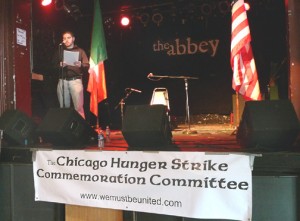 A chairde agus a chomrádaí,
A chairde agus a chomrádaí,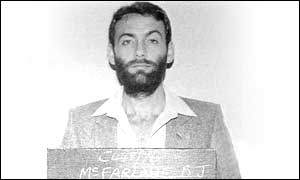
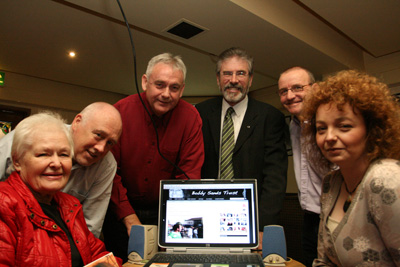

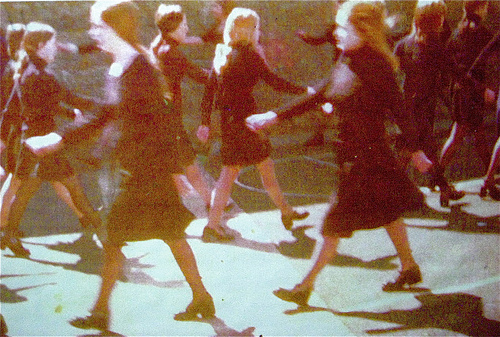
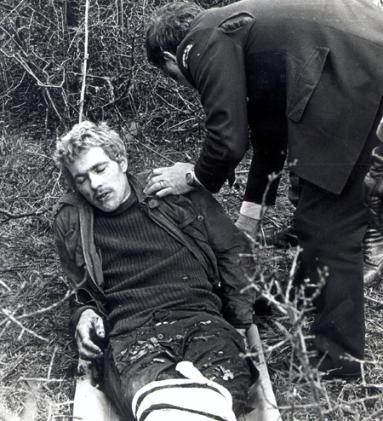
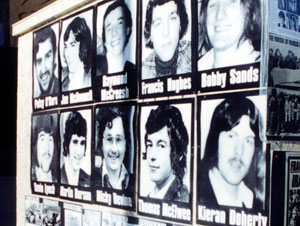
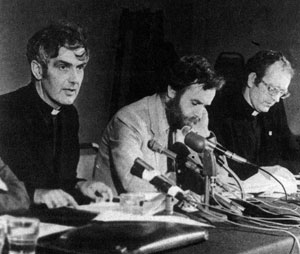
 It has withstood the blows of a million years, and will do so to the end.
It has withstood the blows of a million years, and will do so to the end.